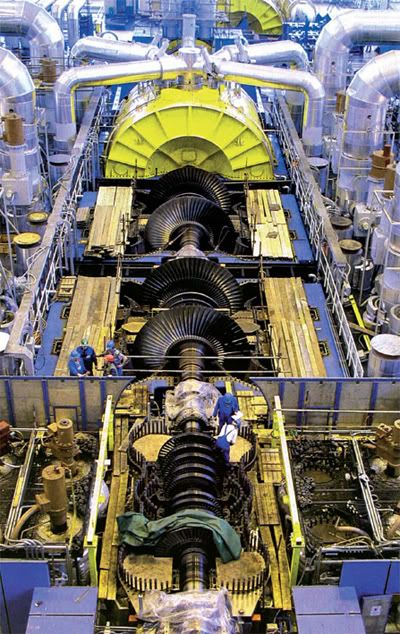Replacing "Earth" in the example with a Space Colony doesn't change much, though. If this Turbine is in space, and it's trying to get energy to a location on the ground, the energy has to get there somewhere.
Options are to:
-Transmit the energy directly from the turbine to the end location. Probably the only way to make the idea fly, but there are complications. Not very efficient, and the farther you have to transmit the energy, the more you'll lose en route. After a pretty short distance, you'll have lost 99% of it. Again, depending on distance/location, you could also have planets, moons, comets, etc in the way, and you're trying to hit a target that's moving VERY fast with a microwave. More problems than you're allowing for.
-Ferry the energy there, via batteries, or something else. Not really feasible. Going to spend more energy on creating and moving around the batteries than you'll produce. Also, you'll now need people AT these facilities, right? How are the batteries getting pulled out, shipped to the destination,a nd new ones hooked up? At the receiving end, you've gotta swap old batteries for fresh ones, and then transmit the power to a ground station. Not sure how fast shipping will be, but you'll dissapate some of the battery en route. You've then gotta beam it down, losing another percentage. Between the microwaves, fuel for shipping the batteries around, and then keeping people alive at both stations, you're far in the red.
- A little easier if the colony is free-floating and not ground-based, but makes the colony itself MUCH harder to keep going, and the tradeoffs are worse. On the plus side, you could beam the energy directly there, so you don't lose that last bit. If the floating colony was NEAR the sun, could hook this turbine up directly to the colony, and bring in power via cables, which would probably work, but if it's hot enough to make water, you've got a lot of work protecting the colonists. And why is the colony floating near the sun, other than the turbine? And at that distance, wouldn't massive solar panels be easier to get going, just as efficient (no atmosphere in the way), and not require any extra work (no moving parts, no water loss, etc)?
-Could go with the turbine on the ground, but that already exists, is known about, and in use, and negates the entire space idea.
plenty to talk about, if you're actually interested in talking critically about it rather than looking for praise...





 You do realize that the cost of fuel will sink the idea? You would be better off just burning the fuel in a generator on earth to create the energy.
You do realize that the cost of fuel will sink the idea? You would be better off just burning the fuel in a generator on earth to create the energy.